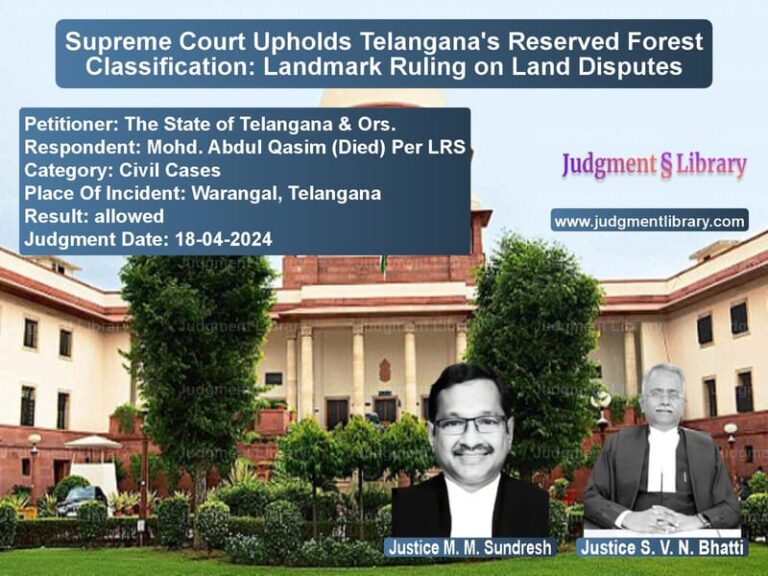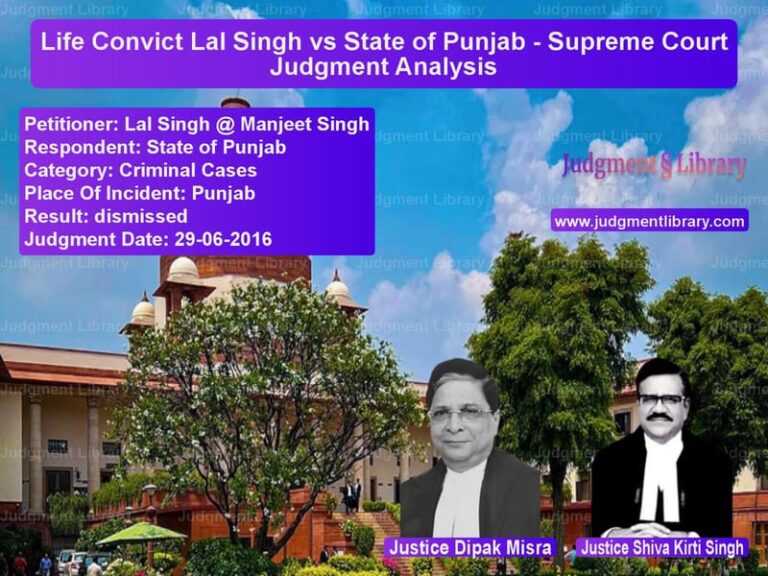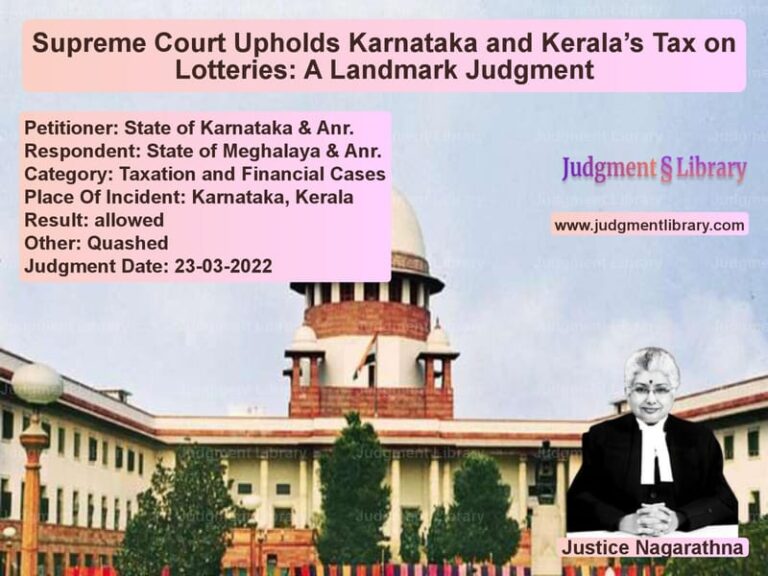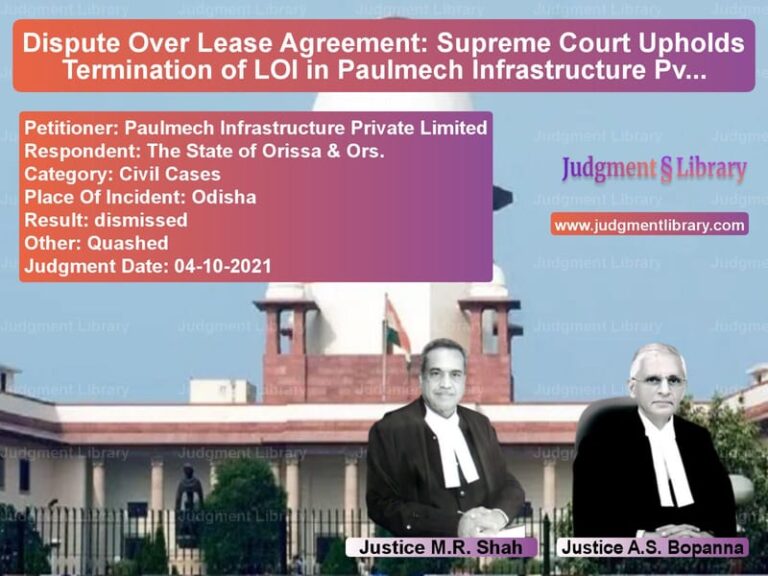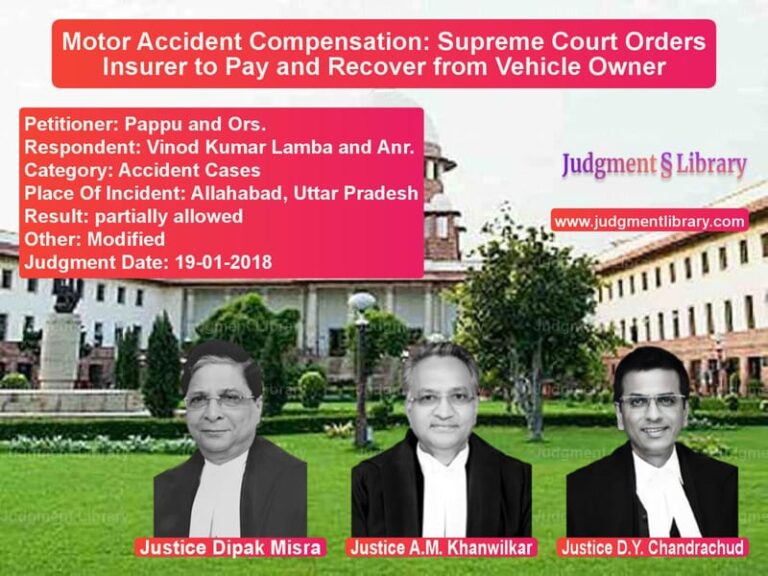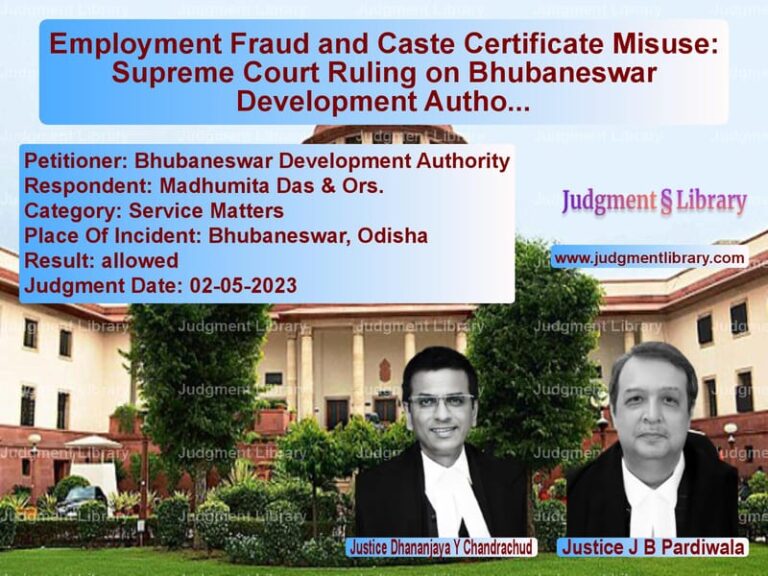Supreme Court Upholds NHAI’s Right to Levy Toll on National Highways
The Supreme Court of India has ruled in favor of the National Highways Authority of India (NHAI) in a long-standing dispute regarding the collection of toll fees at the Runni Toll Plaza on the Muzaffarpur-Sonbarsa section of National Highway-77. In the case of Chairman, National Highways Authority of India & Anr. v. Arvind Kumar Thakur & Anr., the Court set aside a High Court order that had barred NHAI from levying toll fees until the completion of the entire project.
Background of the Case
The dispute arose when respondent Arvind Kumar Thakur filed a writ petition before the Delhi High Court, challenging the levy of toll fees at the Runni Toll Plaza. The petitioner argued that toll collection was being conducted despite the project not being fully completed.
The High Court ruled in favor of the petitioner, directing NHAI to cease collecting tolls at the location until the entire project was completed. The NHAI subsequently appealed this decision before the Supreme Court.
Key Legal Issues Before the Supreme Court
- Whether NHAI had the authority to collect toll fees under the National Highways Act, 1956, and the National Highways Fee (Determination of Rates and Collection) Rules, 2008.
- Whether the term “section of national highway” under Rule 3(1) of the 2008 Rules justified the collection of tolls for partially completed projects.
- Whether the High Court erred in interpreting the provisions of the National Highways Act and Rules by barring toll collection.
Petitioner’s Arguments
The National Highways Authority of India, represented by its Chairman, argued:
- The 2008 Rules clearly allowed for toll collection on sections of national highways that had been completed and made operational.
- A notification issued on November 26, 2013, indicated that a significant portion of the highway (61.70 km) had been completed, justifying the collection of toll fees.
- The construction was being undertaken on a “Build, Operate, and Transfer” (BOT) basis, with the contractor being paid annuity fees. Stopping toll collection would disrupt the financial arrangements in place.
- The funds collected from toll fees had been deposited in a nationalized bank as per a Supreme Court directive, and these funds were essential for the project’s financial viability.
Respondent’s Arguments
The respondent, Arvind Kumar Thakur, contended:
- Toll fees should not be levied until the entire highway project was completed as per Rule 3(1) of the 2008 Rules.
- Users were being charged for an incomplete highway, which was unjust and violated the principles of fair toll collection.
- The toll collection process was arbitrary and unfair, as users were not getting the full benefits of the completed infrastructure.
Supreme Court’s Observations
The Supreme Court reviewed the legal framework and made the following key observations:
1. Definition of “Section of National Highway”
The Court noted that while the term “section of national highway” was not explicitly defined in the National Highways Act, 1956, or the 2008 Rules, its interpretation in this case should be based on the notification issued in 2013. This notification clearly allowed toll collection on completed portions of the highway.
2. Financial Viability of Toll-Based Infrastructure
The Court emphasized that stopping toll collection would adversely affect the financial model under which highway projects are undertaken. The Build, Operate, and Transfer (BOT) model relies on a steady revenue stream from toll fees to ensure project sustainability.
3. Toll Collection as a Means to Recover Investment
The Court highlighted that the NHAI was recovering its investment through toll collection and that these funds had been deposited in a nationalized bank. Given the financial arrangements in place, it would be impractical to refund toll fees collected thus far.
4. High Court’s Erroneous Interpretation
The Supreme Court found that the High Court had failed to consider key aspects of the toll collection process and had misinterpreted Rule 3(1) of the 2008 Rules. The Court held that the High Court’s ruling was legally unsustainable.
Final Judgment
The Supreme Court ruled in favor of NHAI and held:
- The judgment of the Delhi High Court was set aside.
- NHAI was authorized to continue collecting tolls from users on completed sections of the highway.
- The funds collected so far could be utilized for project costs and maintenance.
- The Union Government and NHAI were encouraged to examine whether the definition of “section of national highway” required further clarification to avoid similar disputes in the future.
Implications of the Judgment
This ruling is a landmark decision that affirms NHAI’s authority to collect tolls on completed sections of highways. It underscores the importance of a consistent legal framework for toll collection and provides clarity for future projects.
The judgment ensures that infrastructure projects under the BOT model remain financially viable, allowing for continued investment in national highways. It also sets a precedent for interpreting the 2008 Rules in a manner that balances user rights with the economic sustainability of highway projects.
Petitioner Name: Chairman, National Highways Authority of India & Anr..Respondent Name: Arvind Kumar Thakur & Anr..Judgment By: Justice Sanjiv Khanna, Justice Sanjay Kumar, Justice R. Mahadevan.Place Of Incident: Muzaffarpur-Sonbarsa, Bihar.Judgment Date: 24-07-2024.
Don’t miss out on the full details! Download the complete judgment in PDF format below and gain valuable insights instantly!
Download Judgment: chairman,-national-h-vs-arvind-kumar-thakur-supreme-court-of-india-judgment-dated-24-07-2024.pdf
Directly Download Judgment: Directly download this Judgment
See all petitions in Contract Disputes
See all petitions in Damages and Compensation
See all petitions in Public Sector Employees
See all petitions in Specific Performance
See all petitions in Debt Recovery
See all petitions in Judgment by Sanjiv Khanna
See all petitions in Judgment by Sanjay Kumar
See all petitions in Judgment by R. Mahadevan
See all petitions in allowed
See all petitions in Quashed
See all petitions in supreme court of India judgments July 2024
See all petitions in 2024 judgments
See all posts in Civil Cases Category
See all allowed petitions in Civil Cases Category
See all Dismissed petitions in Civil Cases Category
See all partially allowed petitions in Civil Cases Category


